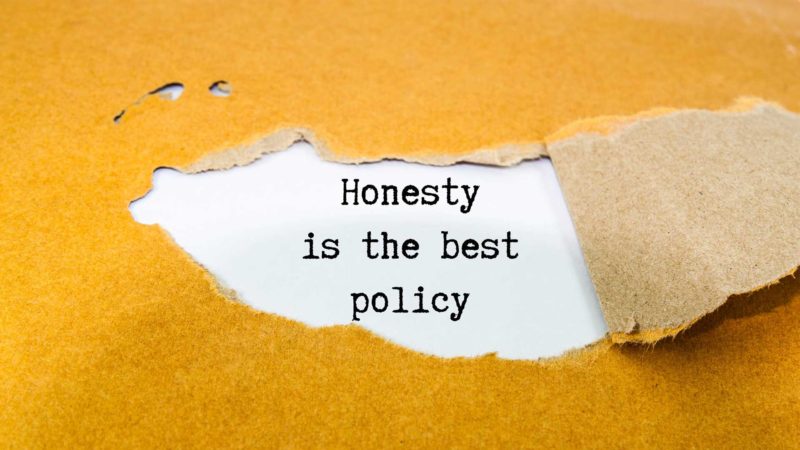
The most important part of the relationship between you and your link builder might not be what you think.
You want them to follow Google’s guidelines (or you might not care) and build great links.
You want their work to give you more traffic and better rankings.
You may be fine with certain risky tactics, or you may only be building links because your competitors are, and you feel the need to keep up.
You may think you want a lot of things, but what you really need is transparency.

Transparency
I’ve spoken to business owners and webmasters who used a link team in the past and never saw the links that were built.
In my opinion, that’s not right. You know exactly where the links are, even if you created content in hopes it would generate links, so you can easily dig around and find out where those links are and report them.
I’ve also dealt with a lot of people who do know which links were built and had no idea how they were built.
- Are they on a private blog network (PBN)?
- Were they purchased?
- Are they within Google’s guidelines?
- Were they built by the person hired to do the job, or were they handed off to another company?
We have a serious problem in the link-building industry, and it is not simply the divide between doing things the “right” way and taking more risks. It’s more about being honest and upfront about the work itself.

Honesty
I’ve heard so many horror stories about a company contracting with an agency for link services who in turn subcontracted out to someone else. For all you know, the subcontractor could be handing off the job to a sub-subcontractor! You are then multiple steps away from your link builder, which is not a good scenario.
When I talk to potential clients who inquire about using paid links, I ask if they understand the risk of doing so. When I ask about their backup plan for potential problems they may face down the road as a result of using paid links, they ask why they need one. They don’t understand they are doing anything wrong.
Most people don’t know what we know about Google’s guidelines. They just know they want to rank well. Because of their lack of knowledge, it’s not enough to say “OK” to their every request. You have to make sure they fully understand the risks involved with all tactics and sign off on them.
Link-building education
People outside of the search industry don’t spend their days reading about algorithm updates, manual penalties, disavowing links, which methods might get hit next and so on. Throwing some words around to say you’ve brought up certain issues isn’t enough, you really need to be an educator as well as service provider.
Most people in the search industry know I have no issues with paid links and I’ve never advocated using paid links exclusively, but you know what? I can’t name many link-building methods that aren’t risky in some way. Remember how perfect guest posting was, until it wasn’t?
Whatever tactics you’re using, I strongly recommend you disclose what you are doing to the people that hire you. Explain what’s being done, why it’s being done and where it’s being done, and then have them sign off on it.

Questions to ask
If you are planning to hire a link-building company, here are a few basic questions to ask.
- How will you be building links?
- Will you be guest posting?
- Will you be submitting the site to a ton of directories?
- Will you be using broken link building techniques?
- Will you be creating and posting sponsored content?
- How do you find good sites to contact?
- Do you cast a wide net and email 1,000 sites and then see which ones are viable, or do you spend more time upfront vetting them?
The following questions require more in-depth answers:
Will these links violate Google’s guidelines?
With regard to links, you need to read Google’s webmaster guidelines and read them often to see if anything new has been added.
If you are OK working outside their guidelines, fine, but I would still recommend you check for changes often.
If you want to stay within the guidelines, you definitely want to bookmark them. I say this regretfully, but I wouldn’t take anyone’s word for it when they say they’re working within the guidelines. I’d double check for myself.
What are my risks?
As with many other aspects of online marketing, you can do really well and then drop off the rankings map for various reasons.
The ultimate risk is being deindexed, which I don’t see happen often. What I do see are sites plummeting in the rankings after being hit algorithmically or from a manual action, so everyone needs to understand how comfortable they are with this possibility.
I’ve seen many sites violate Google’s guidelines and continue to enjoy great rankings and traffic, just as I’ve seen sites that really did nothing intentionally wrong get hit and take ages for their rankings to bounce back. In my opinion, many things are risky, so you need to have an honest conversation, not just with your link builder, but also with your team and your partners.
What are some examples of the links I can expect to see?
We have a company non-disclosure policy that forbids us from showing examples of links we’ve built to other companies. That policy seems to be fairly standard in our industry; however, it is acceptable to ask for examples of links that can be found and acquired. You should be able to give a potential client an idea of the kind of links you build.
What will I do if I’m hit with a penalty?
I think the best link builders are ones who can do link audits and help fix backlink issues, so if you’re doing any major link building I’d ask what the plan is in case something does happen. You definitely need to be thinking ahead.
What results can I expect?
I am always very reluctant to give an answer without saying, “No one can predict results.” I understand you can make assumptions based on past work and current analysis, but sometimes things go better than expected and sometimes they don’t. I would never trust anyone who claims they can guarantee an organic ranking position or guarantee a certain amount of organic traffic unless they worked for a search engine.
In closing
What works one day in search marketing may not the next. No one outside of Google or Bing can tell you why your web pages rank they way they do.
Risky tactics may pay off, and safe ones may not. I just urge you to ask questions and really make sure you understand exactly what is being done or your behalf when you hire someone to build links for you.
If someone can’t or won’t answer these questions, I think you’re better off looking elsewhere.
Contributing authors are invited to create content for Search Engine Land and are chosen for their expertise and contribution to the search community. Our contributors work under the oversight of the editorial staff and contributions are checked for quality and relevance to our readers. The opinions they express are their own.



